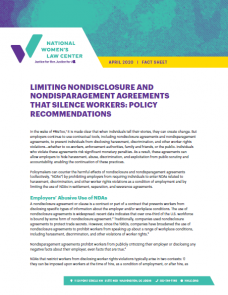 In the wake of #MeToo, it is made clear that when individuals tell their stories, they can create change. But employers continue to use contractual tools, including nondisclosure agreements and nondisparagement agreements, to prevent individuals from disclosing harassment, discrimination, and other worker rights violations—whether to co-workers, enforcement authorities, family and friends, or the public. Individuals who violate these agreements risk significant monetary penalties. As a result, these agreements can allow employers to hide harassment, abuse, discrimination, and exploitation from public scrutiny and accountability, enabling the continuation of these practices.
In the wake of #MeToo, it is made clear that when individuals tell their stories, they can create change. But employers continue to use contractual tools, including nondisclosure agreements and nondisparagement agreements, to prevent individuals from disclosing harassment, discrimination, and other worker rights violations—whether to co-workers, enforcement authorities, family and friends, or the public. Individuals who violate these agreements risk significant monetary penalties. As a result, these agreements can allow employers to hide harassment, abuse, discrimination, and exploitation from public scrutiny and accountability, enabling the continuation of these practices.
Policymakers can counter the harmful effects of nondisclosure and nondisparagement agreements (collectively, “NDAs”) by prohibiting employers from requiring individuals to enter NDAs related to harassment, discrimination, and other worker rights violations as a condition of employment and by limiting the use of NDAs in settlement, separation, and severance agreements.
